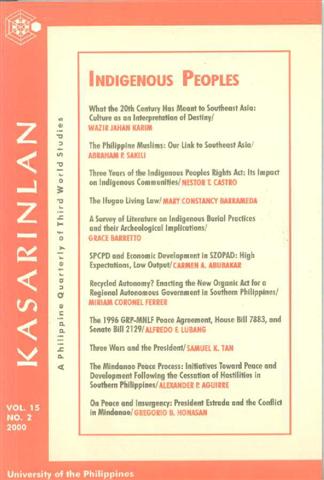What the 20th Century has Meant to the Southeast Asia: Culture as an Interpretation of Destiny
Abstract
Long before the Americans and Europeans shipped their values and institutions beyond their borders, Southeast Asia was one of the world's most diverse cultural regions that thrived within a system of limited trade. The entry of Western culture ended the era of self-definition and actualization. Despite the reclamation of nationhood after colonization, Southeast Asian countries remain bound to a mutated Western culture. The Malaysians, Indonesians and Filipinos within and across countries have "bogey-fied” each other, resulting in prejudice, mistrust and fear. Also, the desire to match the advancements of the United States and Europe only propels the once proud peoples farther towards and away from the confidence in shaping their own destiny. This confidence was last seen during the struggle for independence. What began as a story of triumph over foreign domination has ended as a caricature of nations as limping dragons, slaughtered tigers, tamed cats and menacing flies now dependent on European-Western investment in technology and capital. Southeast Asian culture can only find itself once again if it reestablishes its unique character of upholding autonomy by entrusting people to know, think and criticize and act upon fundamental issues of societal transformation and development.
Published
2008-10-06
How to Cite
KARIM, Wazir Jahan.
What the 20th Century has Meant to the Southeast Asia: Culture as an Interpretation of Destiny.
Kasarinlan: Philippine Journal of Third World Studies, [S.l.], v. 15, n. 2, oct. 2008.
ISSN 2012-080X.
Available at: <https://journals.upd.edu.ph/index.php/kasarinlan/article/view/1106>. Date accessed: 16 sep. 2025.
Section
Features
Keywords
Cultural Identity; Bogey Man; bogey
By submitting a manuscript, the authors agree that the exclusive rights to reproduce and distribute the article have been given to the Third World Studies Center.



